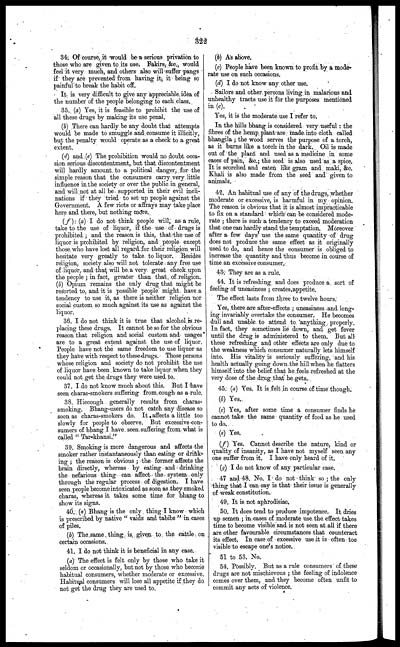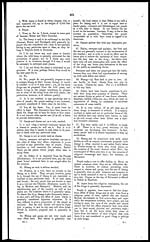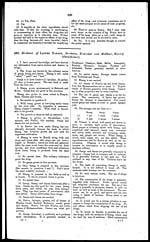Medicine - Drugs > Report of the Indian Hemp Drugs Commission, 1894-1895 > Volume V
(342) Page 322
Download files
Individual page:
Thumbnail gallery: Grid view | List view

322
34. Of course, it would be a serious privation to
those who are given to its use. Fakirs, &c., would
feel it very much, and others also will suffer pangs
if they are prevented from having it, it being so
painful to break the habit off.
It is very difficult to give any appreciable idea of
the number of the people belonging to each class.
35. (a) Yes, it is feasible to prohibit the use of
all these drugs by making its use penal.
(b) There can hardly be any doubt that attempts
would be made to smuggle and consume it illicitly,
but the penalty would operate as a check to a great
extent.
(d) and (e) The prohibition would no doubt occa-
sion serious discontentment, but that discontentment
will hardly amount to a political danger, for the
simple reason that the consumers carry very little
influence in the society or over the public in general,
and will not at all be supported in their evil incli-
nations if they tried to set up people against the
Government. A few riots or affrays may take place
here and there, but nothing more.
(f): (a) I do not think people will, as a rule,
take to the use of liquor, if the use of drugs is
prohibited; and the reason is this, that the use of
liquor is prohibited by religion, and people except
those who have lost all regard for their religion will
hesitate very greatly to take to liquor. Besides
religion, society also will not tolerate any free use
of liquor, and that will be a very great check upon
the people; in fact, greater than that of religion.
(6) Opium remains the only drag that might be
resorted to, and it is possible people might have a
tendency to use it, as there is neither religion nor
social custom so much against its use as against the
liquor.
36. I do not think it is true that alcohol is re-
placing these drugs. It cannot be so for the obvious
reason that religion and social custom and usages
are to a great extent against the use of liquor.
People have not the same freedom to use liquor as
they have with respect to these drugs. Those persons
whose religion and society do not prohibit the use
of liquor have been known to take liquor when they
could not get the drugs they were used to.
37. I do not know much about this. But I have
seen charas-smokers suffering from cough as a rule.
38. Hiccough generally results from charas-
smoking. Bhang-users do not catch any disease so
soon as charas-smokers do. It affects a little too
slowly for people to observe. But excessive con-
sumers of bhang I have seen suffering from what is
called "Tar-khansi."
39. Smoking is more dangerous and affects the
smoker rather instantaneously than eating or drink-
ing; the reason is obvious; the former affects the
brain directly, whereas by eating and drinking
the nefarious thing can affect the system only
through the regular process of digestion. I have
seen people become intoxicated as soon as they smoked
charas, whereas it takes some time for bhang to
show its signs.
40. (a) Bhang is the only thing I know which
is prescribed by native "vaids and tabibs" in cases
of piles.
(b) The same thing is given to the cattle on
certain occasions.
41. I do not think it is beneficial in any case.
(a) The effect is felt only by those who take it
seldom or occasionally, but not by those who become
habitual consumers, whether moderate or excessive.
Habitual consumers will lose all appetite if they do
not get the drug they are used to.
(b) As above.
(c) People have been known to profit by a mode-
rate use on such occasions.
(d) I do not know any other use.
Sailors and other persons living in malarious and
unhealthy tracts use it for the purposes mentioned
in (c).
Yes, it is the modorate use I refer to.
In the hills bhang is considered very useful: the
fibres of the hemp plant are made into cloth called
bhangila; the wood serves the purpose of a torch,
as it burns like a torch in the dark. Oil is made
out of the plant and used as a medicine in some
cases of pain, &c.; the seed is also used as a spice.
It is scorched and eaten like gram and maki, &c.
Khali is also made from the seed and given to
animals.
42. An habitual use of any of the drugs, whether
moderate or excessive, is harmful in my opinion.
The reason is obvious that it is almost impracticable
to fix on a standard which can be considered mode-
rate; there is such a tendency to exceed moderation
that one can hardly stand the temptation. Moreover
after a few days' use the same quantity of drug
does not produce the same effect as it originally
used to do, and hence the consumer is obliged to
increase the quantity and thus become in course of
time an excessive consumer.
43. They are as a rule.
44. It is refreshing and does produce a sort of
feeling of uneasiness; creates appetite.
The effect lasts from three to twelve hours.
Yes, there are after-effects; uneasiness and long-
ing invariably overtake the consumer. He becomes
dull and unable to attend to anything properly.
In fact, they sometimes lie down, and get fever
until the drug is administered to them. But all
these refreshing and other effects are only due to
the weakness which consumer naturally lets himself
into. His vitality is seriously suffering, and his
health actually going down the hill when he flatters
himself into the belief that he feels refreshed at the
very dose of the drug that he gets.
45. (a) Yes. It is felt in course of time though.
(b) Yes.
(c) Yes, after some time a consumer finds he
cannot take the same quantity of food as he used
to do.
(e) Yes.
(f) Yes. Cannot describe the nature, kind or
quality of insanity, as I have not myself seen any
one suffer from it. I have only heard of it.
(g) I do not know of any particular case.
47 and 48. No. I do not think so; the only
thing that I can say is that their issue is generally
of weak constitution.
49. It is not aphrodisiac,
50. It does tend to produce impotence. It dries
up semen; in cases of moderate use the effect takes
time to become visible and is not seen at all if there
are other favourable circumstances that counteract
its effect. In case of excessive use it is often toe
visible to escape one's notice.
51 to 53. No.
54. Possibly. But as a rule consumers of these
drugs are not mischievous; the feeling of indolence
comes over them, and they become often unfit to
commit any acts of violence.
Set display mode to: Large image | Zoom image | Transcription
Images and transcriptions on this page, including medium image downloads, may be used under the Creative Commons Attribution 4.0 International Licence unless otherwise stated. ![]()
| India Papers > Medicine - Drugs > Report of the Indian Hemp Drugs Commission, 1894-1895 > Volume V > (342) Page 322 |
|---|
| Permanent URL | https://digital.nls.uk/75121854 |
|---|
| Description | Volume 5: Evidence of witnesses from North-Western Provinces and Oudh and Punjab. Answers from witnesses in North-Western Provinces, Oudh and Punjab about cultivation and growth of hemp, preparation or manufacture, trade, consumption or use, effects, administration - taxation and control. |
|---|---|
| Attribution and copyright: |
|




